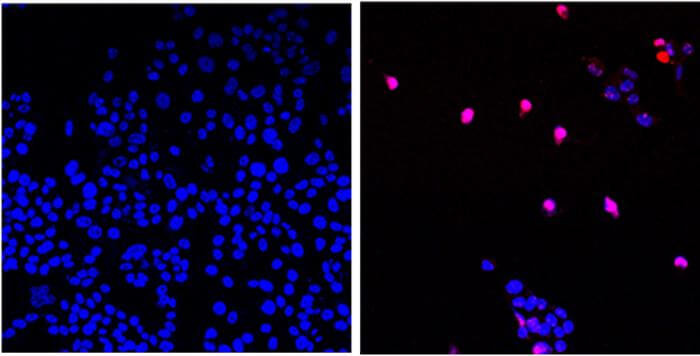LOS ANGELES — Scientists have developed what may be a “holy grail” molecule that eradicates all solid cancer tumors while leaving other cells unaffected. The breakthrough was achieved by the team at the City of Hope Hospital, one of the largest cancer research and treatment organizations in the United States, and targets the proliferating cell nuclear antigen (PCNA) protein.
A mutated form of PCNA assists cancers in their repair and growth. The team has developed a molecule, AOH1996, that targets and eradicates the mutated PCNA. Previously, PCNA was considered too challenging to be a target for therapy, but AOH1996 appears to annihilate all solid tumors in preclinical research.
Scientists are continuing to investigate the mechanisms that enable this cancer-stopping pill to work in animal models, and there is an ongoing Phase 1 clinical trial in humans. The new therapy is the culmination of 20 years of research and development.
Dr. Linda Malkas, a professor in City of Hope’s Department of Molecular Diagnostics and Experimental Therapeutics and the M.T. & B.A. Ahmadinia Professor in Molecular Oncology, leads the team. She elaborated on how the molecule selectively disrupts DNA replication and repair in cancer cells, without affecting healthy cells. Dr. Malkas points out that most targeted therapies focus on a single pathway, allowing crafty cancer cells to mutate and become resistant over time.
“PCNA is like a major airline terminal hub containing multiple plane gates. Data suggests PCNA is uniquely altered in cancer cells, and this fact allowed us to design a drug that targeted only the form of PCNA in cancer cells. Our cancer-killing pill is like a snowstorm that closes a key airline hub, shutting down all flights in and out only in planes carrying cancer cells,” Malkas says in a media release.
“Results have been promising. AOH1996 can suppress tumor growth as a monotherapy or combination treatment in cell and animal models without resulting in toxicity. The investigational chemotherapeutic is currently in a Phase 1 clinical trial in humans at City of Hope.”

The study, published in the journal Cell Chemical Biology, asserts that AOH1996 has been effective in preclinical research in treating cells derived from various cancers, including breast, prostate, brain, ovarian, cervical, skin, and lung.
The molecule was tested on more than 70 cancer cell lines and several normal control cells. Researchers found that it selectively killed cancer cells by disrupting their normal reproductive cycle, preventing cells with damaged DNA from dividing, and stopping the replication of faulty DNA, thereby inducing cancer cell death, or apoptosis, without interrupting healthy stem cells.
“No one has ever targeted PCNA as a therapeutic because it was viewed as ‘undruggable,’ but clearly City of Hope was able to develop an investigational medicine for a challenging protein target,” says Long Gu, Ph.D., lead author of the study and an associate research professor in the Department of Molecular Diagnostics and Experimental Therapeutics at Beckman Research Institute of City of Hope.
“We discovered that PCNA is one of the potential causes of increased nucleic acid replication errors in cancer cells. Now that we know the problem area and can inhibit it, we will dig deeper to understand the process to develop more personalized, targeted cancer medicines.”
Experiments have shown that the investigational pill makes cancer cells more susceptible to agents that damage DNA or chromosomes, suggesting that AOH1996 could become a valuable tool in combination therapies and the development of new chemotherapeutics.
“City of Hope has world leaders in cancer research. They also have the infrastructure to drive translational drug discovery from the laboratory into the clinic for patients in need,” says Daniel Von Hoff, M.D., study co-author and a distinguished professor at Translational Genomics Research Institute, part of City of Hope.
As a next step, researchers will strive to better understand the mechanism of action to further enhance the ongoing clinical trial in humans. City of Hope’s history of groundbreaking translational research includes the development of the technology underlying synthetic human insulin and monoclonal antibodies, which have become integral to widely-used, lifesaving cancer drugs, such as trastuzumab, rituximab, and cetuximab.
AOH1996 is exclusively licensed by City of Hope to RLL, LLC, a biotechnology company that Prof. Malkas co-founded and holds a financial interest in.
South West News Service writer Jim Leffman contributed to this report.
You might also be interested in:
- 5 minutes of daily chores that make you sweat may lower cancer risk
- New prostate cancer pill for advanced cases gives men new hope of survival
- The foam on your morning latte is inspiring a better treatment for cancer


Would love to talk to someone about glioblastoma. Is the study open to new patients?
Darlene, I found this link to apply for the clinical trials. I hope it is helpful!
https://classic.clinicaltrials.gov/ct2/show/NCT05227326?titles=AOH1996&draw=2&rank=1
Sounds very promising. But I do have a question for you what about blood cancers? Will it work on them also? I have waldenstroms macroglobulinemia since November 2019 I have been on wait and watch for now but by peripheral neuropathy is starting to migrate from my feet to my calves. Anyway just hoping that this holy grail will also help those of us with blood cancers.
Is this pill something used with chemo or all by itself? I have 3c1 Carcinosarcoma I have had two chemo treatments and not wanting a third and already lost my hair. I still very much want to fight for my life just not with Chemo. Would your treatment be an option for me?
How do I find out if they accept new cancer cases?
WE WANT MEDICINE FOR VHL RENAL CELL CARCINOMA AND HEMANJIO BLASTOMA
I smell a Nobel moment. 👍
Interested in finding out which lab animals were used in this study.